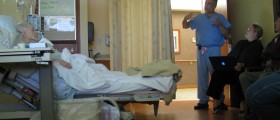
People who are US citizens, 65+, or who are permanently disabled receive what is called Medicare Part A.
In order to receive medicare part A, one is to fulfill one of the following requirements:
work for it
pay for it
be married to someone who has either worked or payed for it.
Because medicare is divided into various parts, not all people get the same. The ones who get medicare Part A, normally go about obtaining it without extra fees. It typically covers certain types of hospitalization, food and room – minus doctor's care, services or ambulance care (which are covered by Medicare B instead).
Medicare Part A is sometimes criticized for not providing a full year of nursing, which is why some people find it necessary to purchase additional medical plans.
However, despite criticism, Medicare Part A targets a sufficient demographic which meets certain requirements.
So who may benefit?
Citizens who may gain Medicare Part A are:
seniors, that is to say, those above 65
those bellow that age limit, with certain disabilities
citizens with End-Stage Renal Disease
How much does it cost?
That all depends on the persons circumstances. A person whose spouse is already a Medicare A customer, there are certain discounts. However, a person not qualified to obtain it for free must pay about 433USD as a monthly fee.
Enrollment
If the person receives the benefits of Social Security, enrollment will be free of charge and automatic the first day of the month the person turns 65. A medicare card will be sent via snail mail three months ahead. Otherwise, signing up for participation will be needed even if the person has the right to the service for free.
Aside from regular channels, medicare may also be obtained by means of purchasing it.
Coverage
Bluntly put, this is what Medicare Part A covers:
the cost of blood transfusion
necessary part-time nursing or physical therapy; speech, language or occupational therapy
hospice care for persons with a life expectancy of six months or less
hospital stay in a semi-private room
up to 100 days in a skilled nursing facility.
There is also a number of services that are not covered by Medicare A. As needs to be made clear, as well, here's the complete list:
acupuncture
cosmetic surgery
custodial care
most types of dental care
routine eye exams
routine foot care
hearing aids/exams
long-term care
routine and annual physical exams
most of the prescription drugs
syringes or insulin
and, naturally, travel.
- healthfinder.gov/api/Outlink/Search/http/www.medicare.gov/coverage/your-medicare-coverage.html?_label_=Use+this+tool+to+see+what+Medicare+covers
- healthfinder.gov/api/Outlink/Search/http/www.medicare.gov/coverage/mammograms.html?_label_=Find+out+about+Medicare+coverage+for+mammograms
- Photo courtesy of Stabenow for Senate, 2012 by Wikimedia Commons: commons.wikimedia.org/wiki/File:Help-save-medicare_(Debbie_Stabenow).png

















Your thoughts on this
Loading...